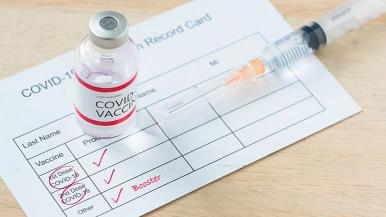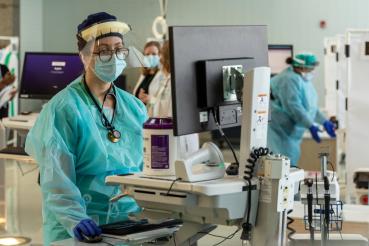How does cancer affect immunity against COVID-19, even if a person is vaccinated? It’s a question that’s been on the minds of many since Colin Powell’s death from COVID-19 complications after battling multiple myeloma.
According to Agne Paner, MD, a hematologist and director of the multiple myeloma program at Rush University Medical Center, multiple myeloma can have a significant impact on a person’s immunity.
“Multiple myeloma is not only a cancer of the blood, but it is also a cancer of the immune system,” Paner says. Normally, the plasma cells in our blood produce antibodies against bacteria and viruses. But in people with multiple myeloma, these plasma cells turn cancerous and can no longer make enough antibodies to protect the body against disease. Certain treatments for multiple myeloma, such as the monoclonal antibody daratumumab and autologous stem cell transplants, can also affect immunity.
“Patients with multiple myeloma are more susceptible to infections, including COVID, and unfortunately, they have a lesser response to vaccines. About 15% of patients don’t respond at all to two shots of COVID vaccination, but we don’t know who those patients will be until we try,” Paner says. According to news reports, Powell had received two doses of an mRNA COVID-19 vaccine.
Boosters especially important
There’s growing evidence that for people with cancer and others with moderately or severely compromised immune systems, getting a third full dose of the vaccine as early as a month after the second shot can boost the production of antibodies and increase a person’s protection against COVID-19, according to Michael Lin, MD, MPH, an infectious disease specialist and associate professor at Rush. That’s important because patients with cancer who are undergoing chemotherapy or immunotherapy treatments also have a higher risk for getting severe COVID-19.
"The lesson learned from General Powell’s passing is that we should all be getting vaccinated. If we are healthier, we have a responsibility to protect those around us who have weaker immune systems.”
COVID-19 boosters are also especially important for people with cancer and others with weak immune systems.
“The boosters, as recommended by the Centers for Disease Control and Prevention, are really meant for people who are still at high risk for serious infections,” Lin says. “That’s why they’ve targeted older people and people with underlying medical conditions. For these people, even a minor COVID-19 infection might make a difference and land them in a hospital.”
The CDC recently updated its booster recommendations, which now apply for all three available COVID-19 vaccines in the United States.
For those who received a Pfizer-BioNTech or Moderna mRNA COVID-vaccine, the following groups are eligible for a booster at six months or more after their initial series:
- People 65 and older
- Those 18 and older who live in long-term care settings
- Those 18 and older with underlying medical conditions
- People 18 and older who work or live in high-risk settings
For people who received the Johnson & Johnson vaccine, booster shots are also recommended for those who are 18 and older and who were vaccinated at least two months ago. The CDC also says that those who are eligible for a booster may choose which vaccine they receive as a booster, and either stick with their original vaccine type or get a different booster.
Doing your part to protect others
Both Lin and Paner agree that another good reason to get a booster is if you live with someone who has cancer or another condition that weakens their immune system. Additional steps you can take to protect others include wearing masks and following social distancing even if you are vaccinated.
Paner urges the public to get vaccinated so they can protect people who are most vulnerable like those with cancer and those 65 and older (Powell was both).
“There’s a considerable number of patients with multiple myeloma who have compromised immune systems and who can only be protected by others around them who get vaccinated,” she says. “I think the lesson learned from General Powell’s passing is that we should all be getting vaccinated. If we are healthier, we have a responsibility to protect those around us who have weaker immune systems.”




